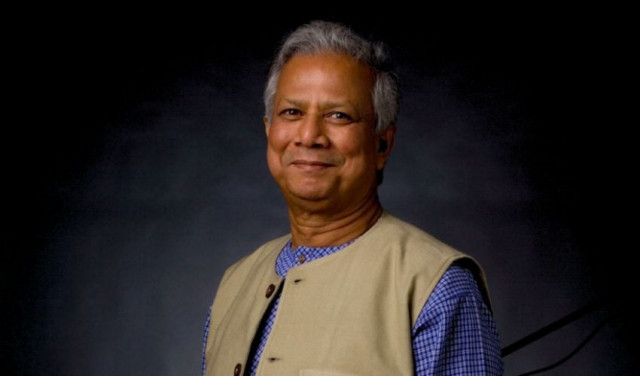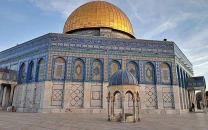Nobel laureate Yunus to head BD interim govt
President dissolves parliament; military reshuffle sees pro-Hasina elements sidelined

Bangladesh's Nobel-winning microfinance pioneer Muhammad Yunus was tapped on Tuesday to lead an interim government after the ouster of prime minister Sheikh Hasina, hours after President Mohammed Shahabuddin dissolved parliament and cleared the way for new elections.
The president's press office said that the decision "to form an interim government with... Yunus as its chief" was taken at a meeting of Shahabuddin, with military leaders and the heads of the Students Against Discrimination group, which led the movement against Hasina government.
Hours earlier, a presidential statement said that the decision to dissolve parliament was taken following meetings with the heads of armed forces, leaders of political parties, student leaders and some civil society representatives.
A day after the escape of Hasina from the country, student protesters had threatened more demonstrations if parliament was not dissolved. Nahid Islam, a key organiser of the campaign against Hasina, had warned that "a government other than the one we recommended would not be accepted".
Hasina's flight on Monday ended her 15-year second stint in power in the country of 170 million people, which she had ruled for 20 of the last 30 years at the helm of a political movement inherited from her father, state founder Mujibur Rahman, after he was assassinated in 1975.
The movement that toppled Hasina rose out of demonstrations against public sector job quotas for families of 1971 war veterans, seen by critics as a means to reserve jobs for allies of the ruling party. Over 400 were killed and thousands injured in violence that ripped through the country.
Monday was the deadliest day since protests began in early July, with a further 10 people killed on Tuesday, taking the total toll overall to at least 432, according to an AFP tally based on police, government officials and doctors at hospitals.
On Tuesday, streets in the capital were largely peaceful - with traffic resuming, shops opening and international flights resuming at Dhaka's airport - but government offices were mainly closed a day after chaotic violence in which at least 122 people were killed.
Many schools and businesses that shut during the unrest were still closed. Garment factories, the mainstay of the country's economy, would reopen on Wednesday after being shut due to the disruptions, their association announced in a statement.
Negotiations on the formation of the interim government continued through Tuesday, a student leader and a government official told Reuters. President Shahabuddin had said that an interim government would hold elections soon after it took over.
Hasina, 76, was accused of becoming increasingly authoritarian, with many of her political foes jailed. Her resignation was greeted by jubilant crowds, who stormed unopposed into the opulent grounds of her residence and carried away furniture and TVs after she fled on Monday.
Hasina flew to India and is staying at a safe house outside Delhi. Indian media had reported that Hasina might travel to Britain, where she had family, including a niece who was a government minister. However, Britain's Home Office declined to comment.
According to Indian media, the newly elected British Prime Minister, Kier Starmer, had declined to grant her asylum upon arrival due to his country's new immigration policies. As a result, the UK had currently refused to provide asylum to Sheikh Hasina, a media report said.
Indian media also reported that, the United States had cancelled Hasina's visa. However, there had been no official comment from the US on this matter. On Monday, a US State Department spokesperson had said in a press briefing that their government stood with the people of Bangladesh.
Hasina's staunch political rival, Begum Khaleda Zia, leader of the main opposition Bangladesh Nationalist Party (BNP) was released on Tuesday after long incarceration. Some of other "missing" people were also released, who were secretly jailed by the Hasina government.
Dr Yunus's name was proposed by the student leaders. Microfinance pioneer Yunus, 84, is credited with lifting millions out of povertyearning the enmity of ousted Hasina and the wide respect of millions of Bangladeshis. He was indicted by a court in June on charges of embezzlement that he denied.
"If action is needed in Bangladesh, for my country and for the courage of my people, then I will take it," Dr Yunus told AFP in a statement, also calling for "free elections", after student leaders called for him to lead an interim government.
The new leadership now rests on the army who had previously said they would form an interim government. The military reshuffled several top generals, demoting some seen as close to Hasina, and sacking Ziaul Ahsan, a commander of the feared and US-sanctioned Rapid Action Battalion force.
Bangladeshi rights groups, as well as US and European Union diplomats, said on Tuesday they were "very concerned" about reports of attacks on religious, ethnic and other minority groups.






1725099588-0/BeFunky-(41)1725099588-0-208x130.webp)












COMMENTS
Comments are moderated and generally will be posted if they are on-topic and not abusive.
For more information, please see our Comments FAQ